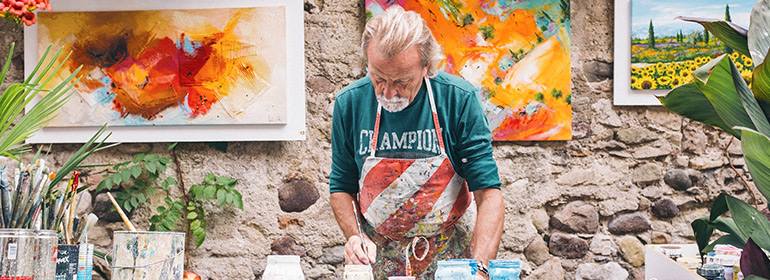As more gay people find themselves over the rainbow, might there be enough demand for an LGBT elders residential care home here in Ireland?
When I was younger, getting old was a source of gags about how my friends would end their days fondly bitching about the good old times in a gay retirement home. It was usually called Shady Pines (1980s reference there) or Over the Rainbow, and every Wednesday, Shirley Temple Bar or Veda would put on a bit of a show before the serious business of bingo.
Of course, this was a movie fantasy of an old people’s home, where illnesses are the minor inconveniences of a dodgy hip or forgetfulness in the evening, but most inhabitants remained pretty independent and able to take part in something resembling a happy life.
Now that I’m older, the giggles are a bit more nervous, as in, how the hell could I afford a care home, will there be a spot for me in an increasingly crowded and underfunded system, and what level of care am I likely to need? Even retirement, which used to be strictly enforced at 65 with a disappointing farewell party and some gold-coloured object destined for a drawer, recedes into the future for many of us. Public sector employees have the luxury of a generous (for now) contributory pension, but it’s likely they’ll be closer to 70 by the time it kicks in, that is if the pensions fund hasn’t been absorbed by central government to pay the bills before they can get their hands on it.
Private sector workers can buy pensions, but less than a third have and many of those, after decades of paying into poorly performing funds, will retire with a slender annuity that may just keep the wolf from the door when combined with whatever is left of the state pension.
So far, so grim – it’s perfectly understandable that most of us prefer not to think about old age, in the hope that our dotage will somehow be provided for. For gays, could the situation be worse? Despite the advent of gay marriage and gay parents, many gays will still face old age alone or with fewer family supports than their straight counterparts – if you haven’t had kids and you aren’t rich, navigating the transition from an active taxpaying work life to the hopefully still active other side of the social welfare fence may be harder.
In his excellent documentary, We Need To Talk About Dad, Brendan Courtney showed us how hard it is to get home or in-a-home care for an elderly parent, and that is with the combined efforts and resources of a whole family. The documentary was concerned with the lack of support for families wishing to care for an elderly person in their own home, which is less expensive than a nursing home – for those, start at €1,000 a week and keep adding. For me, the scary part of the show was when Brendan considered how he would manage when it was his time for round-the-clock care. Yes, he has a loving family and friends and many gays of his age now have kids, but still, the prospect of becoming old and in need of care without the security of a traditional family is a frightening one.
Anyway, imagine you’ve managed all that and provided enough for a comfortable retirement. Are you prepared to give up your sexual identity in the care home? The elderly are represented as being sexless, doting grannies or crotchety granddads, whose vices stretch to minor booze or knitting habits. The LGBT elder in this system could well feel oppressed, their fond memories of wild Sitges nights or marriage equality marches ignored or discouraged because they upset the other residents. As more gay people find themselves over the rainbow, might there be enough demand for an LBGT residential care home here? It may even be a lucrative money- spinner for some gays of an entrepreneurial bent.
There are a growing number of LGBT ‘retirement communities’ in the US, Australia, Germany and the UK, where the first generation of liberated gays can have an old age with a rainbow tint. A hurdle is how the state, which subsidises private residential care, views facilities operating a policy that excludes non- LGBT residents. Funding depends on allowing all qualifying pensioners in, so it might take a delicate approach to create an LGBT ‘ethos’ while keeping the state supports.
An LGBT residential care facility will have its own particular challenges. Unfortunately, LGBT people rank high when it comes to league tables for alcohol and drug abuse, as well as mental illnesses like depression. It could mean that the LGBT home will need more resources and therefore be more expensive to run, but then again, maybe there’ll be a subsidising effect from all the rich queens paying through the nose for deluxe care packages. We do like our comforts, after all!
© 2017 GCN (Gay Community News). All rights reserved.
